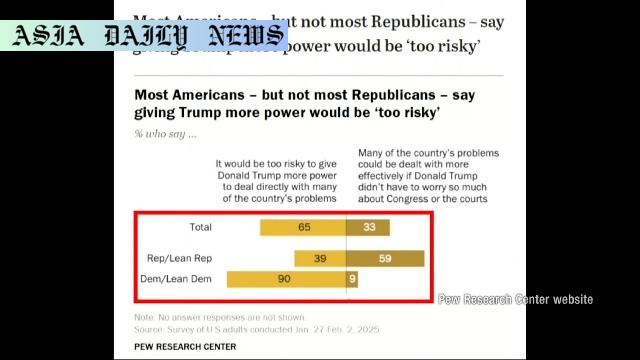Trump Power: Over 65% of Americans find it too risky to grant President Donald Trump more authority amidst his executive orders surge.

Introduction
A recent Pew Research Center survey has shed light on escalating concerns among Americans about the concentration of power in the executive branch. The results suggest that over 65% of the respondents view granting more authority to President Donald Trump as a risky move. This sentiment comes against the backdrop of Trump issuing an unprecedented number of executive orders within weeks of taking office, marking a significant policy departure from his predecessors.
Public Sentiments on Trump’s Power Expansion
According to the survey conducted between January 27 and February 2, 2023, a substantial 65% of Americans find it “too risky” to increase President Trump’s power for addressing national issues. The overall public opinion reflected stark partisan divides, with 90% of Democrats and those leaning toward the Democratic Party expressing concerns. In contrast, only 39% of Republicans and their affiliates saw such a move as risky. These opinions underscore growing polarization in the nation around governance and executive authority.
Executive Order Surge Raises Eyebrows
A key element feeding public unease is Trump’s prolific use of executive orders. Within his first month in office, Trump signed no fewer than 65 executive orders—more than double compared to the tally achieved by Joe Biden in the same timeframe. Critics have argued that some of these executive decisions exceed the constitutional authority vested in the presidency, sparking legal and ethical debates.
Historical Context of Executive Authority
Giving US presidents expanded powers has always been a contentious subject. The Pew study revealed that 78% of Americans view granting more powers to presidents in general as too risky, regardless of which party they represent. This suggests a broader concern not just with Donald Trump, but with the gradual accretion of executive authority, which many fear could undermine democratic checks and balances.
Broader Implications of the Survey
These findings signal a deeper unease about the trajectory of American politics. With mounting polarization, the debate over Trump’s consolidative measures mirrors wider anxieties about governance and constitutional adherence. Critics believe that unchecked authority contradicts Republican ideals that champion state autonomy, while advocates argue that decisive action is necessary to address national crises.
As presidential administrations increasingly turn to unilateral mechanisms like executive orders to bypass legislative gridlock, questions arise about the long-term health of American democracy. The Trump administration’s swift policy shifts through these orders highlight the increasing reliance on concentrated executive action—a trend that some warn could tip the balance of power away from Congress and the judiciary.
Conclusion
The Pew Research survey reveals more than just opinions about Donald Trump; it speaks to a deeper concern about executive overreach and its implications for American democracy. In a time of unparalleled national challenges, balancing robust leadership with respect for constitutional limitations remains a critical issue. The conversation about executive authority, catalyzed by Trump’s presidency, will undoubtedly shape the political landscape moving forward.
Commentary
Reflections on Survey Findings
The findings of the Pew Research Center survey underscore a critical moment in American politics. The level of concern regarding granting more authority to President Trump—or any president for that matter—is a telling indicator of the public’s growing distrust in centralized power. This speaks volumes, given both the historical and contemporary challenges surrounding constitutional checks and balances.
The Public’s Unease
Why does a majority feel that giving Trump more power poses so much risk? It likely stems from his whirlwind policy execution via executive orders, which have bypassed traditional legislative scrutiny. While some may see decisive action as strong leadership, others interpret it as an overstep that threatens democratic governance. The contrast between Democrats’ overwhelming opposition and Republican support, albeit less unanimous, reveals the deeply entrenched partisan divisions in the country.
Long-Term Implications
Perhaps what should give everyone pause is the broader concern—expressed by 78% of respondents—about consolidating power in the presidency itself. This points to a more systemic issue: the weakening of legislative checks on executive authority. As successive administrations lean increasingly on executive orders to achieve their goals, traditional avenues of consensus-building and debate are sidelined, raising serious questions about accountability and representation in governance.
Call for Balance
The survey’s results should encourage leaders across the political spectrum to reflect on ways to preserve and strengthen democratic institutions. Concentrating power may appear effective in the short term, but it risks eroding the delicate balance envisioned by the Founding Fathers. In a time of heightened political polarization, returning to the principles of shared authority and institutional transparency becomes more essential than ever.


